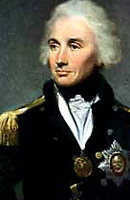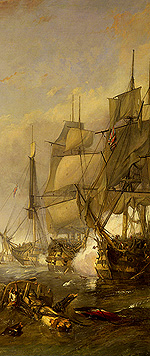 |
 |
12.11.08

Out of Context: The Leadership of Admiral Nelson "What made Nelson a leader whose “immortal memory” we toast? In an understandable desire to construct an objective and measurable account of the competencies required of a leader there is a modern tendency to gloss over the more subtle, moral, and relational aspects of leadership. Recent research, however, by the Exeter University Centre for Leadership Studies reveals that actual practitioners of the art of leadership in various fields put a greater emphasis on the visionary and relational dimensions of leadership than the text books. "In times of danger unless there are people who have a lively sense of what is worth living and dying for then our freedom to live at peace as a society is at risk. 'But at such times of decision leaders need to make contact with foundational convictions and with a sense of calling which comes from going deep within oneself. This is the source of healthy self confidence and the ability to master fear and to encourage people in the most extreme circumstances. Any education system which hopes to produce effective leaders and followers must take the formation of these foundational convictions very seriously. "We live at a strange time when the periodic table and anything that can be quantified and reduced to a mathematical truth is regarded as an accurate description of reality but the Beatitudes and the teachings of the world’s wisdom traditions are seen as little more than the debatable opinions of dead sages.  "A sense of calling, a connection with foundational convictions derived from his belief in God who nerves his worshipers for struggle but also enjoins justice and humanity, a profound sense of the relational element in all great human enterprises - these are Nelson’s contributions to a time when we are once more facing people with fire in their minds, when we need more than efficient regulation and inspection, when we must not neglect the vital work of building up trust and a sense of common purpose among all the citizens of this country." —Bishop of London
Excerpts from the Sermon at St. Paul's on the 200th anniversary of the Battle of Trafalgar, October 23, 2005
Posted by Michael McKinney at 02:46 PM
|
BUILD YOUR KNOWLEDGE
 

How to Do Your Start-Up Right STRAIGHT TALK FOR START-UPS 
Grow Your Leadership Skills NEW AND UPCOMING LEADERSHIP BOOKS 
Leadership Minute BITE-SIZE CONCEPTS YOU CAN CHEW ON 
Classic Leadership Books BOOKS TO READ BEFORE YOU LEAD |